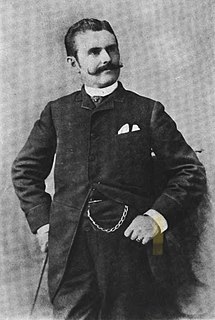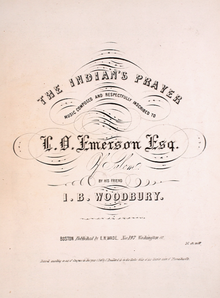
The "Londonderry Air" is an Irish air that originated in County Londonderry, Ireland. It is popular among the American Irish diaspora and is well known throughout the world. The tune is played as the victory sporting anthem of Northern Ireland at the Commonwealth Games. The song "Danny Boy" uses the tune, with a set of lyrics written in the early 20th century.

Thérèse of Lisieux, born Marie Françoise-Thérèse Martin, also known as Saint Therese of the Child Jesus and the Holy Face, was a French Catholic Discalced Carmelite nun who is widely venerated in modern times. She is popularly known in English as "The Little Flower of Jesus", or simply "The Little Flower,” and in French as la petite Thérèse.
"Home Means Nevada" is the state anthem of the U.S. state of Nevada. It was written by Bertha Rafetto in 1932 and officially adopted by the Nevada Legislature in 1933 as the official state song.
The Flower Duet is a duet for soprano and mezzo-soprano in the first act of Léo Delibes' opera Lakmé, premiered in Paris in 1883. It is sung by the characters Lakmé, daughter of a Brahmin priest, and her servant Mallika, as they go to gather flowers by a river.

James Lord Pierpont was an American songwriter, arranger, organist, Confederate States soldier, and composer, best known for writing and composing "Jingle Bells" in 1857, originally titled "The One Horse Open Sleigh". He was born in Boston, Massachusetts, and died in Winter Haven, Florida. His composition "Jingle Bells" has become synonymous with the Christmas holiday and is one of the most performed and most recognizable songs in the world.
"Annie Lisle" is an 1857 ballad by Boston, Massachusetts songwriter H. S. Thompson, first published by Moulton & Clark of Newburyport, Massachusetts, and later by Oliver Ditson & Co. It is about the death of a young maiden, by what some have speculated to be tuberculosis, although the lyric does not explicitly mention tuberculosis, or "consumption" as it was called then. The song might have slipped into obscurity had the tune not been adopted by countless colleges, universities, and high schools worldwide as their respective alma mater songs.

A Christian child's prayer is Christian prayer recited primarily by children that is typically short, rhyming, or has a memorable tune. It is usually said before bedtime, to give thanks for a meal, or as a nursery rhyme. Many of these prayers are either quotes from the Bible, or set traditional texts.

Prayer is used in Scouting worldwide, following the belief of its founder, Robert Baden-Powell, that "a scout is reverent." When creating the Scouting concept, Baden-Powell was adamant that there was a place for God within it. In Scouting for Boys, Baden-Powell wrote:
We aim for the practice of Christianity in their everyday life and dealings, and not merely the profession of theology on Sundays…
"The Swimmer" is a poem by the Australian poet Adam Lindsay Gordon. The poem is from his last volume of poems Bush Ballads and Galloping Rhymes published in 1870, when he was living at Melbourne. In The Poems of Adam Lindsay Gordon, it is grouped among "Poems Swinburnian in Form and Pessimism, but full of the Personality of Gordon."
"The Bard of Armagh" is an Irish ballad. It is often attributed to Patrick Donnelly. He was made Bishop of Dromore in 1697, the same year as the enactment of the Bishops Banishment Act. Donnelly is believed to have taken the name of the travelling harper Phelim Brady. The Irish language version appears to have been lost.
The Ash Grove is a traditional Welsh folk song whose melody has been set to numerous sets of lyrics. The best-known version was written in English by Thomas Oliphant in the 19th century.
Lord Saltoun and Auchanachie, is a Scottish folk song.

Samuel N. Mitchell (1846–1905) was an American song lyricist and newspaperman who wrote lyrics for a number of popular songs in the 1870s.
Singing the Living Tradition is a hymnal published by the Unitarian Universalist Association. First published in 1993 by the Hymnbook Resources Commission of the UUA, it was meant to be much more inclusive in both gender references, multicultural sources, and a wider number of religious inspirations. According to Jason Shelton,
Singing the Living Tradition was the first standard denominational hymnbook to include songs from Unitarians in Eastern Europe, spirituals from the African American tradition, folk and popular songs, music of major, non-Christian religious traditions, and chants and rounds gathered from the various traditions of the world.
Live at Carnegie Hall is a live album by Ryan Adams, released on April 21, 2015.

"The Ragtime Soldier Man" is a World War I era song released in 1912 and 1917. Irving Berlin wrote the lyrics and composed the music. The song was published by Waterson, Berlin & Snyder, Co. of New York, New York. Artist Pfeiffer designed the sheet music cover. It features a U.S. soldier holding his rifle and jumping over cannon balls. The song was written for voice and piano.
Mary Hall Adams was a 19th-century American book editor and letter writer. Her writing include: Sabbath School annual for 1846-, Never give up, or, How children may be happy, and The Rainbow and Other Stories: A Juvenile Gift. Adams died in 1860.

William A. Penno (1843–1929), known by his stage name William A. Huntley, was a composer, music teacher, and vocal and instrumental performer in minstrel and vaudeville traditions. Playing his 5-string banjo before crowds that came to number in the low thousands, he sang in a high tenor and played his banjo bare fingered, picking the strings in a style today named "classic banjo." His published compositions include banjo instrumentals and parlor music. Huntley spent his working life performing and teaching in the off season. He performed throughout the United States and toured Europe as a part of several different minstrel groups. A highlight of his performing career was to play before the Prince and Princess of Wales, about 1880 at Her Majesty's Theatre in London. He moved away from minstrel shows by the 1880s, and "took pride" that he could perform without blackface stage makeup. He focused on building respectability for the banjo, through teaching, composition, and performance recitals. He was featured in the S. S. Stewart Company's catalog and began to play the company's banjeaurine. In 1888 he performed before a crowd of 2,000 people in his hometown, Providence, Rhode Island.
The Left Ginza is one of the two parts of the Ginza Rabba, the longest and the most important holy scripture of Mandaeism. The other part of the Ginza Rabba is the Right Ginza.








